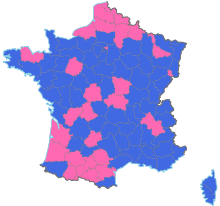Presidential election in France 1995
In the French presidential elections of 1995 , the French people were called on April 23 (1st ballot) and May 7 (2nd ballot) to appoint a successor to President François Mitterrand , who did not run again after two terms in office. The winner was Jacques Chirac , who prevailed in the second ballot with 52.6% of the vote against Lionel Jospin .
Election mode
In order to stand for election in a French presidential election, each candidate must submit at least 500 declarations of support ( parrainages ) from elected French officials (e.g. mayors, MPs). In the first ballot, the candidate who achieved the absolute majority of valid votes could win the presidency. If none of the candidates succeed in this, the two candidates with the highest number of votes in the first ballot would run against each other two weeks later in a run-off election in which the candidate with the most votes is elected president.
Candidates
- Edouard Balladur , center-right, incumbent Prime Minister , relied on much of the centrist UDF and a number of other supporters of the political right.
- Jacques Chirac , right, Mayor of Paris and former Prime Minister, was a candidate for the presidency in 1981 and 1988 and had won the runoff election against François Mitterrand in 1988. He had the majority support of the Gaullist RPR .
- Lionel Jospin , center-left, candidate of the Parti socialiste , had clearly prevailed against his opponent Henri Emmanuelli from the left wing of the partyin internal party primaries.
- Jean-Marie Le Pen , far right, head of the Front National , ran for the third time as a presidential candidate for his right-wing extremist party.
- Robert Hue , left, general secretary of the Parti communiste
- Arlette Laguiller , far left, was the fourth presidential candidate for the Trotskyist Lutte Ouvrière .
- Philippe de Villiers , right, candidate for the national conservative Mouvement pour la France
- Dominique Voynet , green, Les Verts
- Jacques Cheminade , independent candidate. Cheminade (* 1941) was and is the head of the LaRouche movement in France
History and election campaign
After 14 years of presidency of the socialist François Mitterrand, a change of the presidency to the political right was expected, especially since the left was divided.
After the parliamentary elections in 1993 , which were won by the right , Balladur and Chirac reached an agreement that Balladur would become prime minister and that Chirac should give priority to the 1995 presidential election. In view of the high personal popularity ratings, Balladur decided at the beginning of 1995 to compete himself. In addition to the majority of the centrist UDF, he was also able to win some prominent supporters from his own party, the RPR founded and led by Chirac, including the then budget minister Nicolas Sarkozy . This “betrayal” permanently destroyed the political relationship between Chirac and his future successor.
Since Chirac also ran and the socialists had found a competitive candidate in Lionel Jospin, a three-way battle for qualification for the second round of voting emerged. The polls initially saw Balladur clearly ahead; Chirac was able to overtake Balladur in February / March. In the pre-election polls, a head-to-head race Chirac-Jospin-Balladur emerged.
Result of the first ballot
| candidate | Number of votes | in % |
|---|---|---|
| Lionel Jospin | 7 098 191 | 23.30% |
| Jacques Chirac | 6 348 696 | 20.84% |
| Edouard Balladur | 5,658,996 | 18.58% |
| Jean-Marie Le Pen | 4,571,138 | 15.00% |
| Robert Hue | 2,632,936 | 8.64% |
| Arlette Laguiller | 1 615 653 | 5.30% |
| Philippe de Villiers | 1 443 235 | 4.74% |
| Dominique Voynet | 1 010 738 | 3.32% |
| Jacques Cheminade | 84 969 | 0.28% |
Lionel Jospin's surprising victory in the first ballot promised excitement for the runoff election against Jacques Chirac, who could hope to win over the majority of Balladur and Le Pen's sympathizers. For Balladur, the defeat meant the end of his government career. Le Pen again achieved a very good result. The Communist Party (PCF) was in deep crisis after the collapse of the Eastern Bloc and the collapse of the Soviet Union and had a weak position within the French left.
Second ballot
Jacques Chirac narrowly won the second ballot on May 7, 1995:
| candidate | Number of votes | in % |
|---|---|---|
| Jacques Chirac | 15 763 027 | 52.64% |
| Lionel Jospin | 14 180 644 | 47.36% |
Chirac had reached the goal of his political career on the third attempt. As president, he immediately recalled his rival Balladur and installed his confidante Alain Juppé as prime minister . Sarkozy was also no longer a member of the new cabinet. After his honorable results, Jospin became the undisputed leader of the political left for the next seven years.

